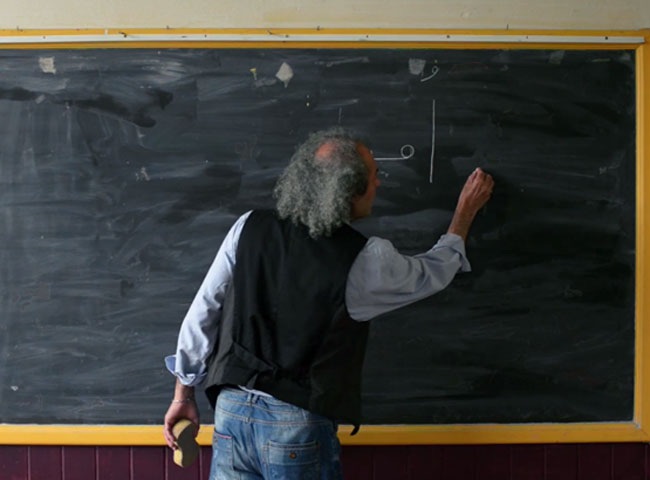I comme Iran
-
Réalisé par Sanaz Azari • Écrit par Sanaz Azari
-
Belgique • 2014 • 50 minutes • HD • Couleur
- Réalisation :
Sanaz Azari - Écriture :
Sanaz Azari - Image :
Vincent Pinckaers - Son :
Frédéric Meert, Matthieu Roche - Montage :
Effi Weiss
- Production (structure) :
CVB - Centre Vidéo de Bruxelles - Coproduction :
CBA - Centre de l'Audiovisuel à Bruxelles - Diffuseur :
RTBF - Radio Télévision Belge Francophone - Participation :
Beursschouwburg Brussels, Fédération Wallonie-Bruxelles - FWB, Région Bruxelles-Capitale, Commission communautaire française - COCOF - Ayant droit :
CVB - Centre Vidéo de Bruxelles
- N° ISAN :
non renseigné
Résumé
Bruxelles, dans le huis clos d’une salle de classe. À partir d'un manuel datant de la révolution islamique, la réalisatrice apprend à lire et écrire le persan, sa langue maternelle. Au fil des leçons, son professeur lui transmet les rudiments de la langue, porte d'entrée vers l'histoire et la culture iraniennes. Progressivement, le didactisme des leçons est détourné en un collage poétique et visuel qui met en jeu la notion de liberté et questionne le sens d'une révolution.
"How can one talk about Iran today? How can you do it when you left Iran as a child and the Persian language is now completely foreign to you? Sanaz Azari answers these questions with somewhat philosophical simplicity. In a classroom somewhere in Belgium, she is learning how to read and write in her mother tongue. There is a textbook from the time of the Islamic revolution on her desk. In front of her, there is a black board, on which the teacher, a grey-haired Iranian, exiled as well, carefully traces words and sentences which are far from trivial. “Dad doesn’t give bread, because there is no work” is written on the board. Out of these words deciphered with much effort, and these images stuck in time, something much wider appears. This is the method Sanaz Azari has chosen, in all modesty, in order to address the revolution. The choice of a subjective camera puts us right next to her, as pupils, watchful of the tiniest details, all ears to what the teacher has to say about the 1979 events or the good wine from Shiraz. His intimate relationship with Iran, his remorse and nostalgia contrast with the hesita- tions, the laborious perseverance and the distant memories of the director, who tries to make her way towards a country she doesn’t really know. Her path is difficult and tortuous, just like the path of the revolution itself, but in this case the mouse might labour and bring forth a mountain."
(Céline Guénot - FIDMarseille)
Mot(s)-clé(s) thématique(s)
Sélections et distinctions
- 2015 • The Curitiba Biennal • Curitiba (Brésil) • Sélection
- 2015 • RISC-Rencontres Internationales Sciences et Cinémas • Marseille (France) • Sélection
- 2015 • Filmer à tout prix • Bruxelles (Belgique) • Sélection
- 2015 • Images en bibliothèques • Paris (France) • Film soutenu par la Commission nationale de sélection des médiathèques
- 2014 • Festival International du Film d'Amiens • Amiens (France) • Sélection
- 2014 • Festival dei Popoli • Firenze (Italie) • Compétition Internationale
- 2014 • Traces de Vies • Clermont-Ferrand (France) • Prix de la Création
- 2014 • Escales Documentaires • La Rochelle (France) • Sélection
- 2014 • Festival international du film francophone de Namur • Namur (Belgique) • Compétition courts-métrages "Regards du présent"
- 2014 • FIDMarseille - Festival International de Cinéma de Marseille • Marseille (France) • Prix Georges de Beauregard International - Mention spéciale
Comment avoir accès au film ?



